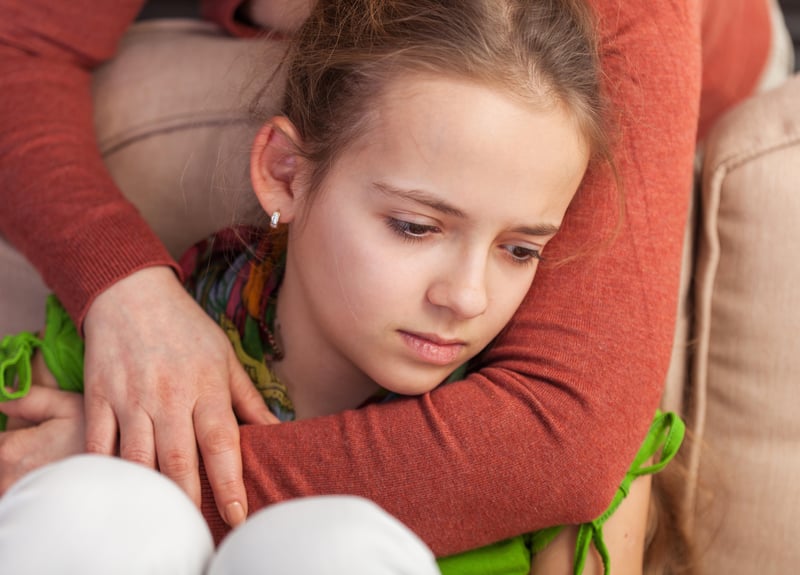Manténgase sano!

- By Cara Murez HealthDay Reporter
- Posted October 12, 2022
Screen Kids 8 and Older for Anxiety, Expert Panel Recommends
Children aged 8 and up should be screened for anxiety, the influential U.S. Preventive Services Task Force (USPSTF) recommended on Tuesday. Kids aged 12 and up should also be screened for depression, the task force advised.
This is the first time the task force has recommended anxiety screening for young children. The depression recommendation is the same as the Task Force issued in 2016.
The Journal of the American Medical Association (JAMA) published the USPSTF recommendations Oct 11.
"The Task Force reviewed the evidence on screening for anxiety, depression, and suicide risk to provide primary care professionals with guidance on how they can help support the mental health of children and adolescents,"member Martha Kubik, a professor with the School of Nursing in the College of Health and Human Services at George Mason University, said in a USPSTF statement.
"Fortunately, screening older children for anxiety and depression can identify these conditions so children and teens can receive the care that they need,"Kubik added.
The new recommendations apply to children who are not already diagnosed with a mental health condition and who don't have recognized symptoms of anxiety or depression.
"The 2018-2019 National Survey of Children's Health (NSCH) found that 7.8% of children and adolescents aged 3 to 17 years had a current anxiety disorder. Anxiety disorders in childhood and adolescence are associated with an increased likelihood of future anxiety disorder or depression,"the experts noted in their recommendation.
"Too many children and teens in the United States experience mental health conditions, including anxiety, depression, and suicidal thoughts or behaviors," the panel added in their statement. "There are several forms of anxiety, including generalized anxiety disorder and social anxiety, but all forms are characterized by excessive fear or worry."
The recommendation on anxiety is in line with those the task force preliminarily recommended for adults under age 65.
Speaking in the USPSTF statement, panel member Lori Pbert said that the recommendation was prioritized "because of its public health importance, especially with the increased focus on mental health in this country that we've been having for the past few years." Pbert is a clinical psychologist and professor at the University of Massachusetts Chan Medical School in Worcester, Mass.
Although the task force considered a recommendation on screening for suicide risk in children and adolescents, it decided not to go forward with that. Members decided there was not enough evidence on the harms and benefits of suicide screening in this age group.
The task force also did not make recommendations for anxiety or depression screening for even younger children, citing a lack of evidence.
"The Task Force cares deeply about the mental health of all children and adolescents. Unfortunately, there are key evidence gaps related to screening for anxiety and depression in younger children and screening for suicide risk in all youth,"Pbert explained. "We are calling for more research in these critical areas so we can provide health care professionals with evidence-based ways to keep their young patients healthy."
In an editorial published alongside the recommendations, doctors from the Ann and Robert H. Lurie Children's Hospital, Weill Cornell Medicine and the University of Cincinnati called the recommendations to screen "very good news."Most psychiatric disorders, including anxiety, begin during childhood and adolescence, they noted.
"Screening in the pediatric primary care setting is important for early identification and offers the potential for earlier and more effective treatment to reduce distress, impairment, and morbidity associated with delayed recognition and treatment,"the editorial said.
The writers noted that the evidence report does not give specific guidance for how screening should happen in primary care settings.
"While future research efforts are needed to address the gaps in the evidence base, the available evidence appears to support moving forward with implementing screening and treatment for anxiety disorders in pediatric primary care settings,"they wrote.
Dr. Oscar Bukstein of Boston Children's Hospital also wrote an editorial published Tuesday in JAMA. Bukstein said the recommendations suggest there are many more questions to be asked than can be answered with current evidence.
"Suicidal behavior is among the most critical of medical emergencies for adolescents,"and screening for suicide is the "cornerstone of suicide prevention,"Bukstein wrote.
"It is not coincidental that the USPSTF considered evidence for suicide and depression screening in the same updated Evidence Report and Systematic Review,"he wrote. "Given the salience of depression as a risk factor for suicidal behavior and the value of depression screening as supported by the USPSTF recommendation, screening for suicide under the umbrella of depression screening could accomplish both screening tasks at the same time."
More information
The U.S. National Institute of Mental Health has more on anxiety disorders.
SOURCES: Journal of the American Medical Association, Oct. 11, 2022; Statement, U.S. Preventive Services Task Force, Oct. 11, 2022





